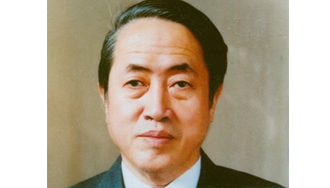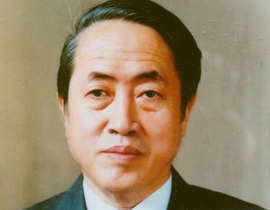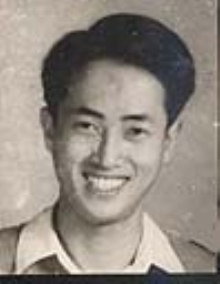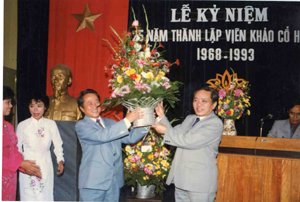
Professor Ha Van Tan was born on August 16, 1937 in Tien Dien commune, Nghi Xuan district, Ha Tinh province (the same village as the great poet Nguyen Du) - a land, a family of studious and scholarly people with many talented people of all times.
As a child, Professor Ha Van Tan lived and studied in his hometown, inheriting the family tradition, the clan and the cultural land where he was born. In early 1955, after graduating from grade 9, Ha Van Tan went to Hanoi. After a year of studying and working hard, Ha Van Tan decided to study History at the University of Education. In 1957, at the age of twenty, Ha Van Tan graduated from university (ranked 2nd - First Runner-up) and stayed at the school to work as a staff member of the Department of Ancient Vietnamese History, University of Education (at that time, the University of Education and the University of General Education had the same teaching staff, but Ha Van Tan was on the payroll of the University of Education. Later, when the two schools separated, he was on the payroll of the University of General Education) under the charge of Professor Dao Duy Anh.

Professor, People's Teacher Ha Van Tan was Head of the Department of Historical Methodology, Faculty of History (1982 - 2009); Director of the Institute of Archaeology (Vietnam Academy of Science and Technology) (1988-2008).
In Ha Van Tan's life, he was fortunate to study and then work with teachers who later had a great influence on his learning path. First of all, there was Mr. Nguyen Cao Hien, a descendant of the Nguyen Khac Tuan and Nguyen Khac Dan families when Ha Van Tan was still in high school in Ha Tinh. In the History department, there were teachers such as Dao Duy Anh, Tran Duc Thao, Truong Tuu, Cao Xuan Huy... But unfortunately, not long after that, all the teachers had to leave the school. From then on, Ha Van Tan began a tireless journey of studying - teaching - studying - teaching intertwined.
When he came to intern at the Department of Ancient Vietnamese History, Ha Van Tan was very worried. Ha Van Tan mocked himself, "With a 9+2 level, what can you do?", so he decided to plunge into studying. And in front of him was a great example of self-study, Professor Dao Duy Anh. If you want to self-study, the only way is to read books. And if you want to read books, you have to master the language. Before studying foreign languages, Ha Van Tan studied Vietnamese, read books on phonetics, grammar, and especially studied issues related to the origin of Vietnamese. Later, Ha Van Tan was so good at languages that he became a member of the Vietnam Language Association and was invited by linguist Cao Xuan Hao to do linguistics together. Then, just by self-studying, he became fluent and used Chinese, French, English, Russian, German, and Japanese well. Ha Van Tan learned German through Russian books, Japanese through Chinese books, and even found a way to learn Sanskrit - an ancient Indian language that is very difficult to learn - through German. For Ha Van Tan, language is just a key, not a goal, and indeed, foreign languages have helped him a lot on his scientific journey.
The first work that teacher Dao Duy Anh assigned Ha Van Tan to do was proofreading.Geographyby Nguyen Trai written in Chinese in the 15th century, was translated into Vietnamese by Confucian scholar Phan Huy Tiep. The "annotated" version was 115 pages long, 4 times longer than the original text (38 pages). To find documents for the "annotated" part, Ha Van Tan had to read about 30 Chinese books and 16 Vietnamese books, all in original Chinese (according to statistics by researcher Nguyen Vinh Phuc). Professor, People's Teacher Phan Huy Le wrote: "Mr. Tan's first work was editing and annotating the book Du Dia Chi by Nguyen Trai translated by Mr. Phan Duy Tiep, published in 1960 when he was only 23 years old. I still remember, in the Department meeting, when commenting on this work, Professor Dao Duy Anh said in general: "Very elaborate, serious, I am very satisfied and trust the author". His talent and scientific style were revealed right in this first work."
After Mr. Dao Duy Anh left the school, Ha Van Tan was assigned to teach Vietnamese History from ancient times to the end of the Ho Dynasty. And, therefore, he was assigned by Professor Tran Van Giau to write with Tran Quoc Vuong.History of the primitive communist regime in Vietnamand episode IHistory of feudalism in Vietnam.Through writing these two books, Ha Van Tan became interested in the prehistoric issues of Vietnam and the issues from the early autonomy to the end of the Tran Dynasty. It can be said that the orientation of his entire scientific life was determined.

Professor, People's Teacher Ha Van Tan in his youth
In 1960, the Faculty of History, Hanoi University invited Professor, Doctor PIBoriskovsky from Leningrad University to help Vietnam build the field of archaeology. Ha Van Tan and Tran Quoc Vuong followed "Cu Bo" on archaeological surveys to learn. They not only became familiar with the French relics discovered by the Hoa Binh and Bac Son cultures, but also made new discoveries themselves. As an expert on paleontology, Professor Boriskovsky's experiences and lively lectures had a great influence on Ha Van Tan. Moreover, under the guidance of Professor "Bo", Ha Van Tan and Tran Quoc Vuong wroteOverview of Vietnamese primitive archaeology(printed in 1961). The book, in addition to general knowledge, also presents new discoveries of Vietnamese archaeology about the Stone Age. And by chance, in 1988 he started working at the Institute of Archaeology, then became the Director of the Institute of Archaeology, National Institute of Social Sciences and Humanities.
Archaeology requires a broad understanding and interdisciplinary knowledge. Therefore, Ha Van Tan moved on to research on physical anthropology (Anthropologie Physique), especially on skull research, then on statistical mathematics, and prehistoric Southeast Asian archaeology. Every time he discovered and conquered a new field, Ha Van Tan left his mark on that field with highly appreciated scientific products. Ha Van Tan never studied for the sake of studying, but studied to produce products in one form or another. From that, he drew two valuable experiences for scientists after him:""If you want to learn any subject well, you must know how to combine what you have learned with research and teaching" and "passion is not enough, you must be persistent, and a little reckless, seriously reckless!". Perhaps that is why, in his nearly 50 years of dedicated research and teaching, he has guided 25 graduate students to successfully defend their doctoral theses, and has published 298 articles, papers, and scientific research in domestic and foreign journals. He is also the author and co-author of 15 books. Those successes are not only in Archaeology.

Professor Ha Van Tan at the anniversary ceremony of the Institute of Archaeology
Ha Van Tan's next passion and successful field is Vietnamese history from the 10th to the 14th century.The resistance war against the Yuan-Mongol invasion(written together) is a typical book for his research on this period. According to Do Thuy Lai, the book is attractive not only because of many rare foreign documents, but also because of the way of writing with many clear and tight analyses, recreating the historical atmosphere and affirming very early the erudition and profound ability of Ha Van Tan. From studying ancient and medieval history, Ha Van Tan paid attention to the issue of land and cultural issues in the period from the 10th to the 14th century. The love of Buddhist history began to blossom in Ha Van Tan when he studied Buddhist scriptures in Hoa Lu, then he delved into Vietnamese Buddhism from the 10th to the 14th century and wrote his research in the bookHistory of Vietnamese Buddhism. To understand the history of Vietnamese Buddhism, Ha Van Tan must read more widely about the history of Buddhism in India and China. Then from Indian Buddhism, he must learn ancient and medieval Indian philosophy, then more broadly the history of Eastern philosophy...
Historical theory was not the number one priority field in Ha Van Tan's research activities, but like other great historians, he realized very early the necessity of historical theory in historical research and it seemed that historical theory was a predestined relationship with him. Since the 1970s, Ha Van Tan had lectured to students of the Faculty of History on topics of Historical Materials, Texts, etc. In 1982, he proposed to the Faculty and prepared all conditions to establish the Department of Historical Methodology at the Faculty of History, Hanoi National University, and he was later assigned to be the head of the Department. When he started to study methodology, he had to read many similar foreign books. After reading, he realized that there was no book that presented a complete historical methodology. The authors only presented a number of methodological issues, not a systematic presentation of historical methodology. He found for himself a way of presentation that had as its starting point the theory of activity that Marx had proposed. Based on that theory, he considered scientific research as an activity whose object of activity is the object of science and whose subject of activity is the scientist. Ha Van Tan also focused on professional training for staff in the Department of Historical Methodology, guiding young staff to build and perfect training programs, supporting research learning materials... Unfortunately, his plan to write a textbook on methodology was not completed, as well as other textbooks that Ha Van Tan wanted to write such as historiography, textual studies, imprint studies, ancient script studies, epigraphy studies... and lecture series on Theoretical Archaeology, on archaeological schools, or on Southeast Asian archaeology... when he fell seriously ill.
He was awarded the title of Professor in 1980, the title of People's Teacher, the First Class Labor Medal, the Third Class Labor Medal, the Second Class Anti-American Resistance Medal and the Ho Chi Minh Prize for Science and Technology (2000), and many other medals. But above all, he is one of the "four pillars of the court"In Vietnamese history, the contributions of teachers like him have created a heroic Faculty of History, his name has become the pride of the Faculty of History, of the University of Social Sciences and Humanities, Vietnam National University, Hanoi.
PROFESSOR, PEOPLE'S TEACHER HA VAN TAN
+Work unit: Faculty of History. +Management position: Head of Department of Historical Methodology, Faculty of History (1982 - 2009). Director of the Institute of Archaeology (Vietnam Academy of Science and Technology) (1988-2008).
History of the primitive communist regime in Vietnam.Education Publishing House. H. 1960.History of Vietnamese feudal regime,Volume 1. Education Publishing House, 1960; reprinted 1963. Geography: Introduction, corrections and annotations. History Publishing House, 1960; Reprinted in “Nguyen Trai Complete Works”. Social Sciences Publishing House, 1969; reprinted 1976. Brief introduction to primitive archaeology of Vietnam. Education Publishing House. 1961. The resistance war against the Yuan-Mongol invasion in the 13th centurySocial Sciences Publishing House, 1968; reprints: 1970, 1972, 1975. Russian - Vietnamese historical, ethnological and archaeological terms.Social Sciences Publishing House. 1970. Archaeological Facility(written together)Hanoi University of Science. 1975. History of Vietnamese Buddhism(Part two: Buddhism from Ngo to Tran (10th-14th century)). Social Sciences Publishing House, 1988. Modern philosophy of historyHanoi University of Science. 1990. History of Thanh Hoa(editor-in-chief). Volume 1. Social Sciences Publishing House. Hanoi, 1990. History of Buddhism in Vietnam. Social Sciences Publishing House Hanoi 1992 (Writing Part Two: Buddism from the Ngo to the Tran dynaties) Vietnamese Temple.Social Sciences Publishing House. Hanoi. 1993. Prehistoric and protohistoric thought. History of Vietnamese Thought. Volume I. Social Sciences. 1993 (Part One). Buddhism in Vietnam(co-author). The Gioi Publishers. 1993. Dong Son culture in Vietnam(editor-in-chief). Social Sciences Publishing House. 1994. Ancient Indian Philosophy. Collection of lectures on History of Philosophy, volume I. National Political Publishing House. 1994. Contribute to the study of Vietnamese culture(editor-in-chief). Volume II. Social Sciences Publishing House. 1996. Vietnamese Communal House(co-authored). Ho Chi Minh City Publishing House. 1998. Archeology VietnamStone Age, Institute of Social Sciences. H. 1998 Some historical theory issues. Hanoi National University Publishing House. 2007. Following the footsteps of ancient culturesSocial Sciences Publishing House. H. 1997. The early days of defending the country - Hung King period (editor-in-chief), Vietnam Military History, National Political Publishing House, Hanoi, 1999.
+Ho Chi Minh Prize for Science and Technology in 2000 for the workFollowing the footsteps of ancient cultures. |
Author:MSc. Ho Thi Lien Huong
Newer news
Older news